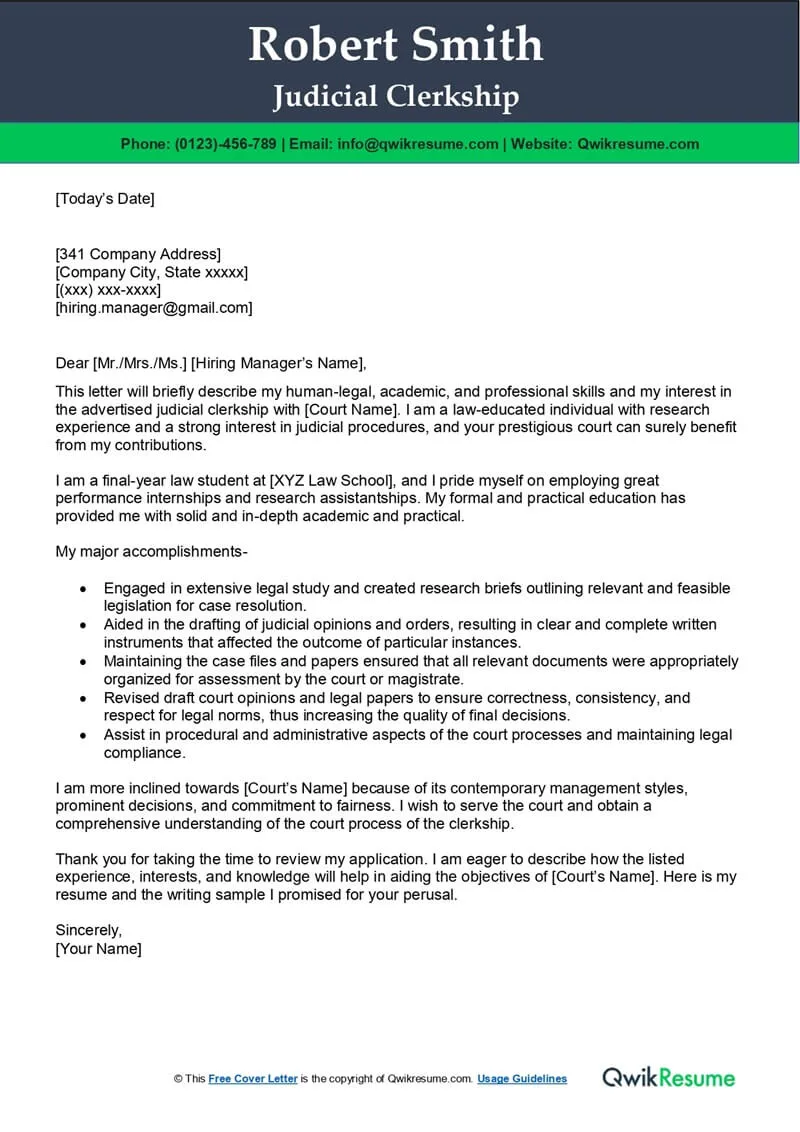Why a Stellar Judicial Internship Cover Letter Matters
A judicial internship is a highly sought-after opportunity for law students and recent graduates. It provides invaluable experience in the legal field, offering insights into the inner workings of the judiciary and the application of law. The cover letter is your first, and often only, chance to make a strong impression on the judge or clerk who will be reviewing your application. It is not merely a formality; it is a critical tool for showcasing your qualifications, expressing your interest, and demonstrating your suitability for the position. A well-crafted cover letter can be the deciding factor in whether you secure an interview, and ultimately, the internship itself. It sets the tone for your application and gives you the opportunity to differentiate yourself from other applicants, highlighting your unique skills, experiences, and passion for the law. Therefore, investing time and effort into writing a stellar cover letter is essential for success in the competitive world of judicial internships.
Demonstrating Your Legal Skills & Knowledge
A successful cover letter must effectively communicate your legal skills and knowledge. This is where you articulate your understanding of legal concepts, demonstrate your ability to analyze complex issues, and highlight your familiarity with legal procedures. It’s not enough to simply state your knowledge; you must provide concrete examples of how you have applied these skills in past experiences. This could include discussing your performance in moot court, your research projects, or any relevant coursework. The key is to demonstrate your ability to think critically, solve problems, and effectively communicate legal arguments, all of which are essential for a judicial internship. Use specific examples to show the judge or clerk that you are not just familiar with the law, but also capable of applying it in a practical setting. This shows you’re prepared for the intellectual rigor of the internship.
Highlighting Relevant Coursework
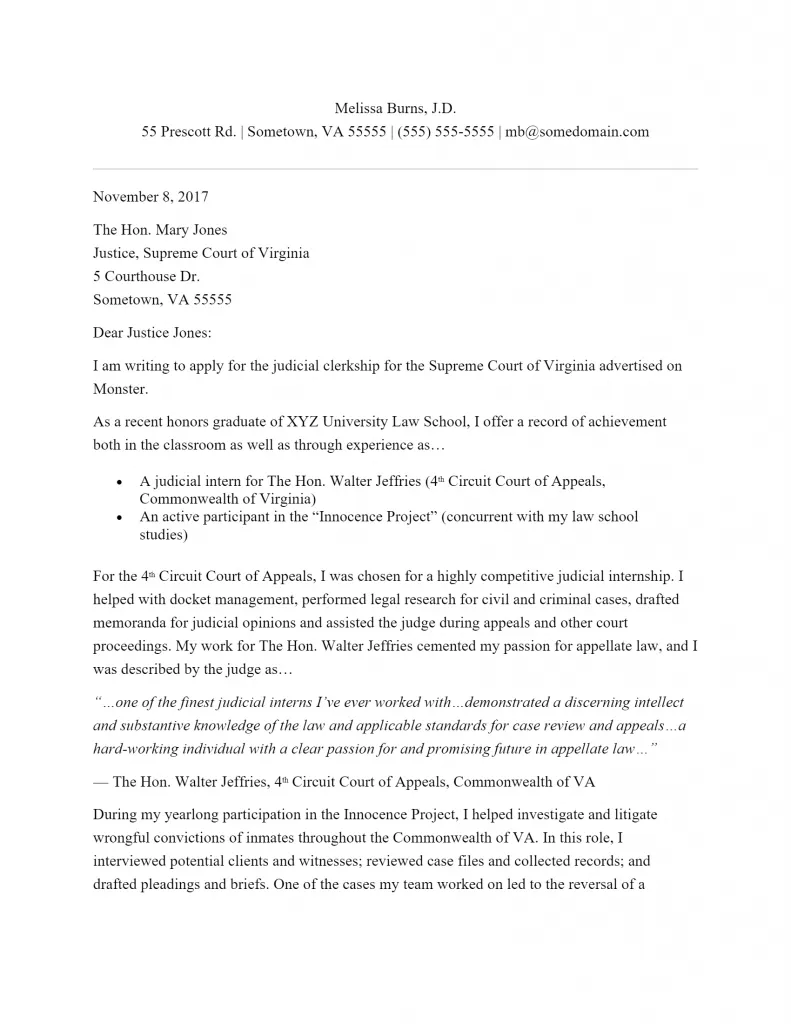
Mentioning specific coursework is an effective way to demonstrate your legal knowledge. Focus on courses that are directly relevant to the type of law or court in which you are applying. For example, if you’re applying for a position in a criminal court, highlight courses like Criminal Law, Criminal Procedure, and Evidence. If you’re interested in civil litigation, emphasize courses such as Civil Procedure, Torts, and Contracts. Briefly describe the key concepts and skills you gained in these courses, and how they have prepared you for the internship. This helps the judge understand your specific areas of expertise and assess your readiness for the challenges of the position. Remember to tailor this section to the specific court and judge, highlighting coursework that aligns with their areas of practice.
Showcasing Your Writing Proficiency
Judicial internships involve a significant amount of writing. You’ll likely be expected to draft legal memoranda, assist with opinions, and perform other writing-intensive tasks. Your cover letter is an ideal place to showcase your writing proficiency. Demonstrate your ability to write clearly, concisely, and persuasively. Proofread carefully for any errors in grammar, spelling, and punctuation, as these can be detrimental. Use strong, active verbs and varied sentence structures to create an engaging and professional tone. Consider including a brief example of your legal writing, such as a short excerpt from a legal memorandum or a well-written analysis of a case. Make sure the content is polished and reflective of your best work. A well-written cover letter will prove that you can handle the writing demands of the internship.
Emphasizing Research Capabilities
Research is a core component of any judicial internship. Judges and their clerks heavily rely on thorough and accurate legal research. Your cover letter should emphasize your research capabilities. Mention your experience with legal research databases, such as Westlaw and LexisNexis. Detail your proficiency in conducting legal research, including your ability to locate relevant case law, statutes, and other legal authorities. Describe the types of research you have conducted in the past, such as researching specific legal issues or preparing legal summaries. Providing specific examples of your research experience can help the judge understand your research skills, for example, outlining a research project you worked on, highlighting your methodology and the outcomes. Highlighting your attention to detail in your research is crucial for a judicial internship.
Articulating Your Understanding of the Judiciary
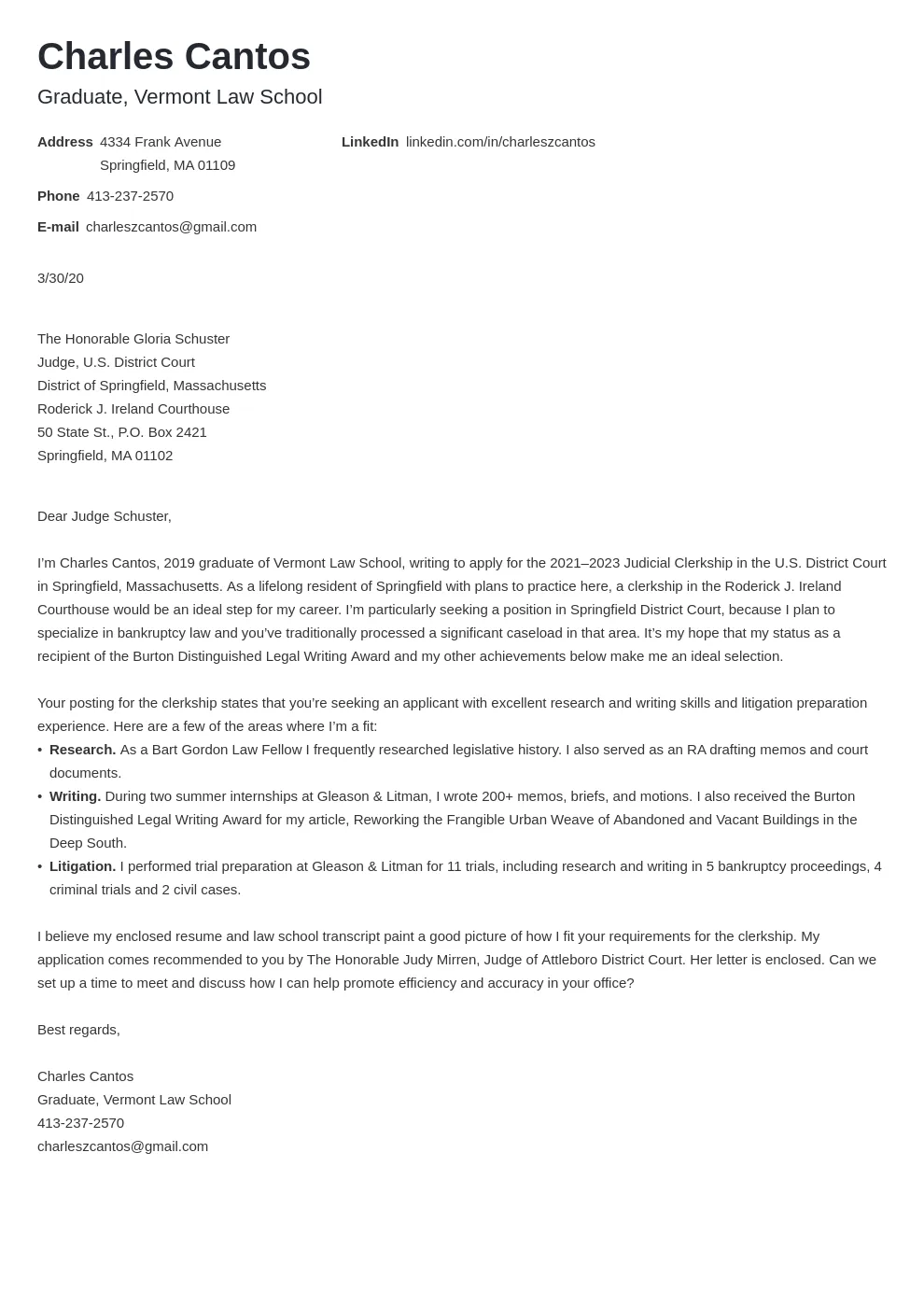
Demonstrate your understanding of the judiciary and its role in society. Show that you understand the importance of impartiality, due process, and the rule of law. Briefly discuss your knowledge of court procedures, legal ethics, and the role of a judge. Mention any relevant experiences, such as observing court proceedings or participating in legal clinics, which have provided you with insights into the judicial system. Your cover letter should demonstrate your respect for the judiciary and your understanding of the judge’s responsibilities. Showing this type of understanding demonstrates your genuine interest and commitment to the position, indicating that you are not only seeking practical experience, but also that you appreciate the important role judges play in upholding justice. Understanding legal precedence shows your analytical capabilities as well.
What to Include in Your Judicial Internship Cover Letter
Your Contact Information
Start with your full name, address, phone number, and email address at the top of the letter. Make sure your email address is professional. Consider using a LinkedIn profile link if appropriate. This provides the judge or clerk with easy access to your contact information and allows them to quickly reach you for an interview or further inquiries. Ensure this information is easy to find and formatted consistently.
The Judge’s Information
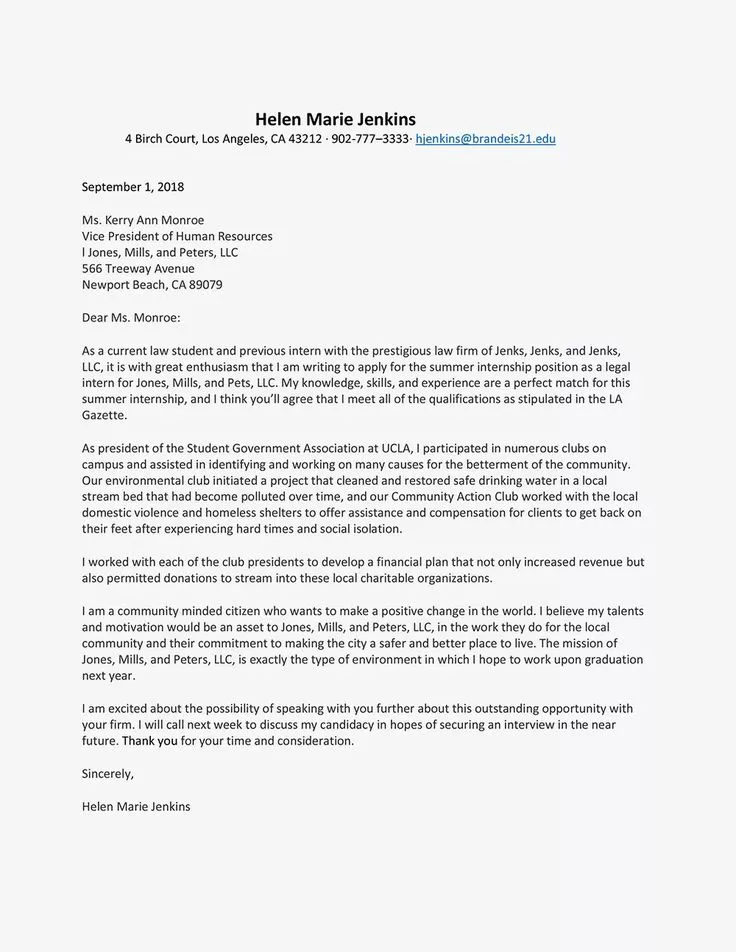
Address the letter to the specific judge you are applying to, if possible. If you don’t know the judge’s name, research it online. Use the correct title (e.g., Honorable Judge Smith). Include the judge’s name, title, court name, and address. Personalizing the letter shows that you have taken the time to research the position and are genuinely interested. This attention to detail demonstrates your professionalism and shows you are committed to the application process. Proper formatting and the correct information is crucial to showing that you care.
A Strong Opening: Grab Their Attention
The opening paragraph is your chance to make a strong first impression. Start with a compelling hook that grabs the reader’s attention. Express your enthusiasm for the judicial internship and clearly state the position you are applying for. Briefly mention where you learned about the opportunity. Your opening should provide a clear statement of your purpose, and it should immediately communicate your interest in the specific position. Use concise, confident language to set the tone for the rest of the letter. A well-crafted opening will make the reader want to continue reading and learn more about your qualifications. Tailor your opening to reflect your genuine interest in the particular judge or court.
Body Paragraphs: Showcase Your Qualifications
The body paragraphs are the core of your cover letter, where you highlight your qualifications, skills, and experience. Use specific examples to demonstrate how your background aligns with the requirements of the internship. Connect your academic achievements, legal experience, and extracurricular activities to the specific tasks and responsibilities of a judicial intern. Show, don’t just tell, by providing concrete evidence of your abilities. Organize your paragraphs logically, with each paragraph focusing on a specific aspect of your qualifications. Use strong action verbs to describe your accomplishments and skills. This is where you can truly distinguish yourself by showcasing your most relevant skills and experiences.
Academic Achievements
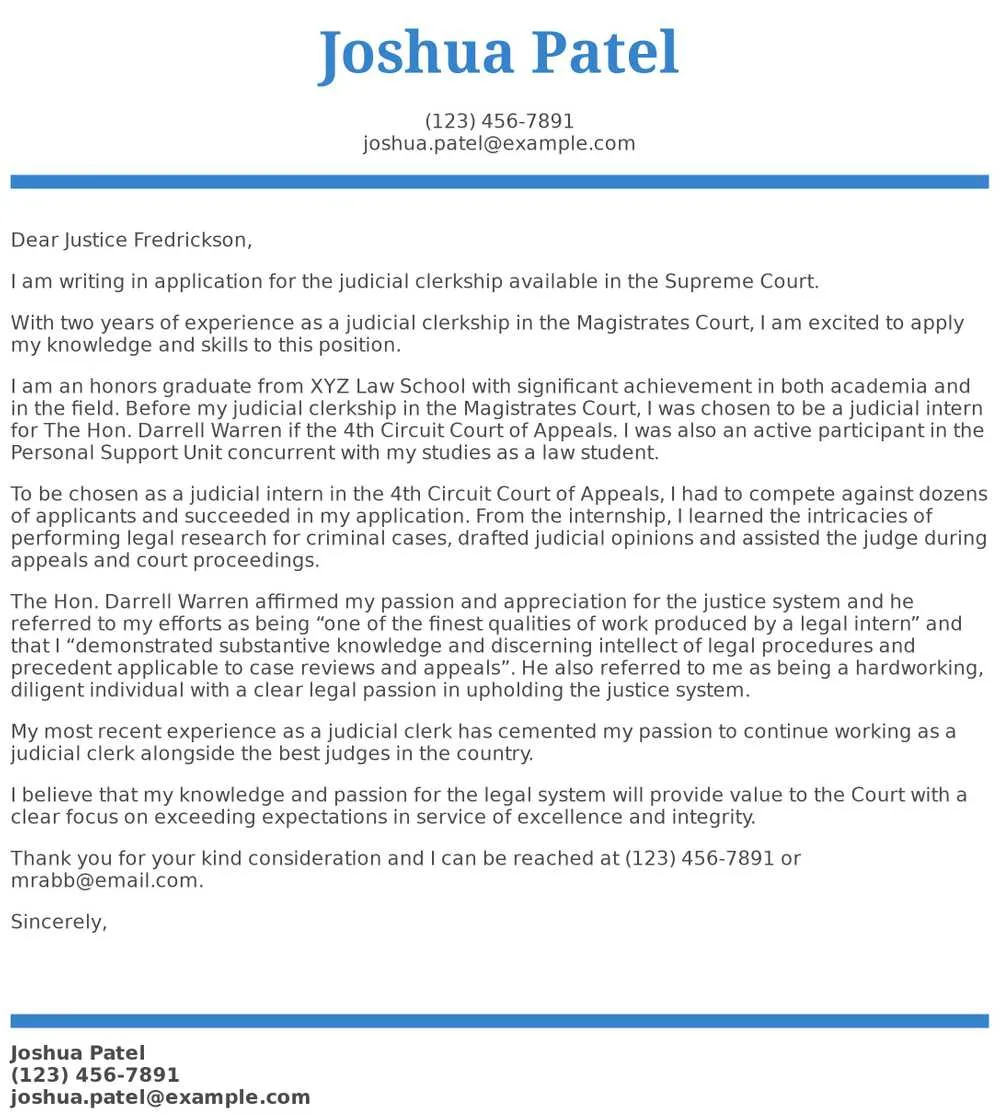
Highlight your relevant academic achievements, such as your GPA, law school rankings, and any academic awards or honors. Mention any coursework that is particularly relevant to the internship, such as courses in evidence, constitutional law, or criminal procedure. Briefly describe the key skills and knowledge you gained in these courses. If you have a strong academic record, it can demonstrate your ability to handle the intellectual demands of the internship. Consider mentioning any academic honors or recognition you received. Focus on achievements that are most relevant to the specific position.
Legal Experience
Describe any legal experience you have, such as internships, clerkships, or volunteer work. Explain your responsibilities and the skills you gained. If you have worked in a law firm or legal clinic, describe the types of tasks you performed, such as legal research, writing, or client interviews. Quantify your accomplishments whenever possible, such as the number of cases you assisted with or the number of legal documents you drafted. Mention any experience you have with legal technology or software. Highlight any experience that demonstrates your ability to work effectively in a legal environment.
Extracurricular Activities & Leadership
Include any relevant extracurricular activities, such as moot court, law review, or student government. Describe your role and responsibilities. Highlight any leadership positions you have held, and explain how you have demonstrated leadership skills. Extracurricular activities can showcase your interests and demonstrate your ability to work effectively with others. If you have participated in moot court, discuss your experience in legal research, writing, and oral advocacy. Include any volunteer work or community involvement that demonstrates your commitment to justice.
Research Skills and Analytical Abilities
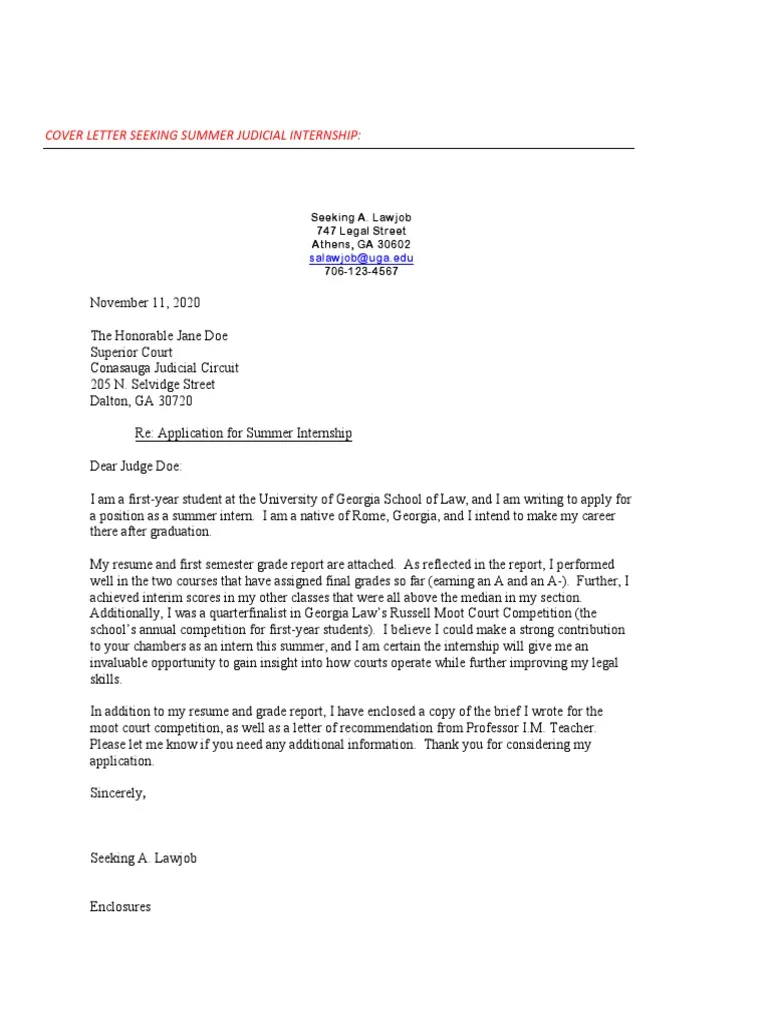
Detail your research skills, including experience with legal databases like Westlaw or LexisNexis. Emphasize your ability to locate and analyze relevant case law, statutes, and other legal authorities. Provide examples of research projects you have undertaken and the results you achieved. Highlight your ability to synthesize information and formulate legal arguments. Mention any experience you have with cite-checking or legal writing. These skills are essential for a judicial internship. Show the judge that you are capable of the analytical rigor required.
Closing: Expressing Your Enthusiasm
Reiterate your interest in the judicial internship and thank the judge or clerk for their time and consideration. Express your enthusiasm for the opportunity to learn and contribute to the court. State your availability for an interview and provide your contact information again. Use a professional closing, such as “Sincerely” or “Respectfully”. Ensure your closing is brief and to the point. A strong closing paragraph reinforces your enthusiasm and makes a lasting positive impression.
Proofreading & Editing: Ensuring Perfection
Proofreading and editing are critical steps in the cover letter writing process. Carefully review your cover letter for any errors in grammar, spelling, punctuation, and formatting. Read the letter aloud to catch any awkward phrasing or unclear sentences. Ask a friend, professor, or career counselor to review your cover letter for feedback. Errors in a cover letter can damage your credibility, so it is important to eliminate any mistakes before submitting your application. Paying attention to detail is crucial, as even small errors can undermine your application. Polishing your cover letter demonstrates your professionalism and attention to detail.
Judicial Internship Cover Letter Sample Analysis
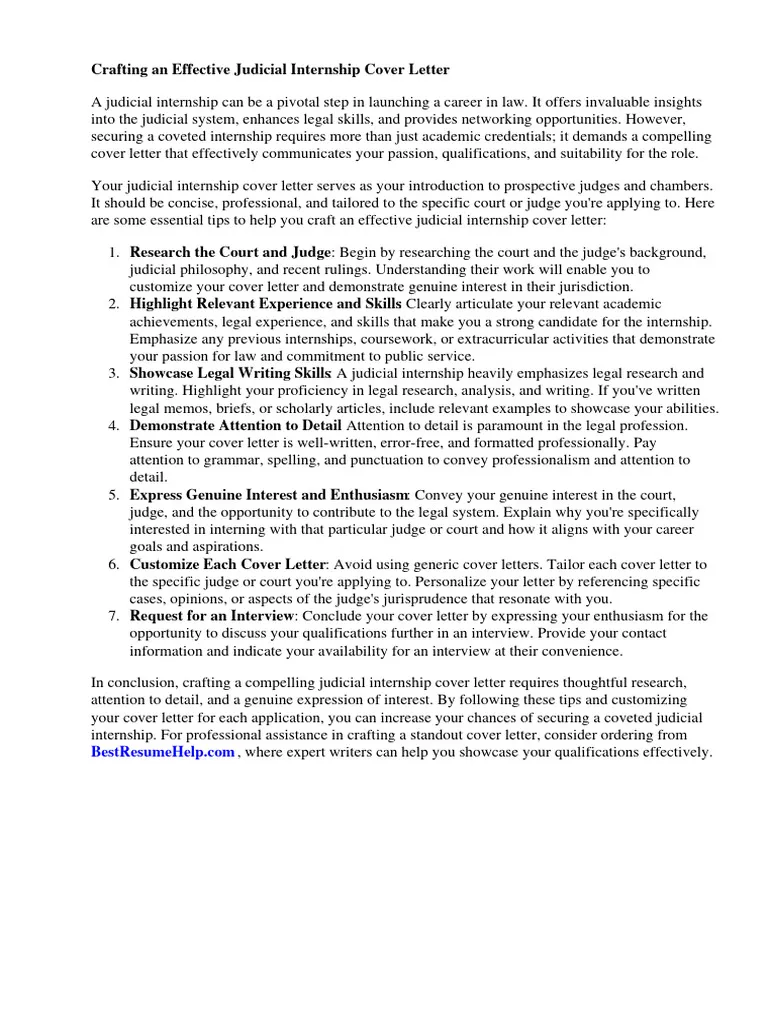
Key Elements to Observe
When reviewing judicial internship cover letter samples, pay close attention to the key elements. Analyze the structure of the letter, including the opening, body paragraphs, and closing. Examine how the applicant presents their qualifications and experience. Observe the use of language, tone, and formatting. Look for examples of how the applicant tailors their letter to the specific judge or court. Review samples to understand what a successful cover letter looks like. You can use this knowledge to adapt and tailor your own letter to demonstrate your suitability for the position.
Language and Tone
Pay attention to the language and tone used in the sample cover letter. Is the tone professional, respectful, and enthusiastic? Does the language convey your understanding of legal concepts and court procedures? Note the use of strong action verbs and clear, concise sentences. The language should reflect your personality and professionalism. The tone should be tailored to the specific judge and court. Consider whether the language used is appropriate for the legal profession and the specific judicial setting. A cover letter with a professional and engaging tone leaves a favorable impression.
Formatting & Presentation
Review the formatting and presentation of the sample cover letter. Is the letter well-organized and easy to read? Does it have clear headings and paragraphs? Note the use of appropriate fonts and margins. Proper formatting is essential for a professional appearance. Ensure the letter is free of any formatting errors. Pay attention to the overall layout of the letter. Ensure a clean and professional appearance to maximize readability and leave a positive impression. This is key to demonstrating your attention to detail.
Common Mistakes to Avoid
Generic Language
Avoid using generic language that could apply to any job or internship. Tailor your cover letter to the specific judge or court and highlight your unique qualifications. Use specific examples to demonstrate your skills and experiences. Avoid clichés and overused phrases. Generic language shows a lack of genuine interest. Provide specific details about your experiences and why you are interested in this position. Show the judge that you have taken the time to research the court. Make your application stand out through tailored details.
Typos and Grammatical Errors
Typos and grammatical errors can damage your credibility and make a negative impression. Proofread your cover letter carefully for any errors. Ask a friend, professor, or career counselor to review your letter for feedback. Avoid relying solely on spell check. Use clear, concise language. Pay attention to details and proofread every single time. A polished cover letter demonstrates your attention to detail and professionalism.
Lack of Tailoring to the Judge or Court
Failing to tailor your cover letter to the specific judge or court is a major mistake. Research the judge’s background, interests, and areas of expertise. Highlight your relevant skills and experiences. Explain why you are specifically interested in this particular internship. A generic cover letter shows a lack of interest and effort. Demonstrating knowledge of the court helps you stand out from the crowd. Be specific. Show that you have done your homework.
Failing to Showcase Passion and Interest
Your cover letter should convey your passion for the law and your genuine interest in the judicial internship. Express your enthusiasm for the opportunity to learn and contribute to the court. Highlight your long-term career goals and how the internship will help you achieve them. Enthusiasm is contagious and will make a positive impression. Make sure that your tone is professional, but don’t be afraid to express your interest. A cover letter without passion won’t resonate with the reader.
Tips for Tailoring Your Cover Letter
Researching the Judge and Court
Researching the judge and court is crucial for tailoring your cover letter effectively. Visit the court’s website to learn about the judge’s background, areas of expertise, and recent cases. Read the judge’s published opinions to understand their legal reasoning and writing style. If possible, search for articles or interviews with the judge to gain further insights. Use this information to personalize your cover letter and demonstrate your genuine interest. Tailoring your application to the judge’s preferences shows you have put in effort.
Highlighting Relevant Experience
Highlight the skills and experiences that are most relevant to the judicial internship. Review the job description and identify the key qualifications and responsibilities. Tailor your cover letter to emphasize the experiences that demonstrate your ability to perform those tasks. Provide specific examples of how you have applied these skills in past experiences. Connect your experience to the internship’s requirements. Tailoring your letter to the specific needs of the court shows that you have a strong understanding of the position.
Addressing Specific Requirements
If the job description includes any specific requirements, be sure to address them in your cover letter. Explain how your skills and experiences align with these requirements. Provide concrete examples to support your claims. If the application requires a writing sample, be sure to include one. Follow all instructions carefully and address any specific requests made in the job description. Following all the instructions shows that you pay attention to detail. Make it easy for the judge or clerk to see how well you fit the requirements.
The Importance of a Strong Resume
While your cover letter introduces you and highlights your strengths, a strong resume complements your application. A resume provides a detailed overview of your education, experience, skills, and accomplishments. It’s the supporting document that provides the specifics. Therefore, it is important to make sure your resume is equally polished and tailored to the judicial internship. A well-crafted resume will give the judge a complete picture of your qualifications. Always make sure your resume is up-to-date, error-free, and reflects the details you’ve provided in your cover letter.
Resume Essentials for Judicial Internships
Your resume should include your contact information, education, legal experience, skills, and any other relevant information. List your education, including your GPA, law school rankings, and any relevant coursework. Provide detailed descriptions of your legal experience, including internships, clerkships, and volunteer work. Highlight your research skills, writing abilities, and any other relevant skills. Tailor your resume to the specific internship, emphasizing the skills and experiences that are most relevant to the position. Proofread carefully for errors in grammar, spelling, and punctuation. A well-organized and tailored resume is crucial to your application.
